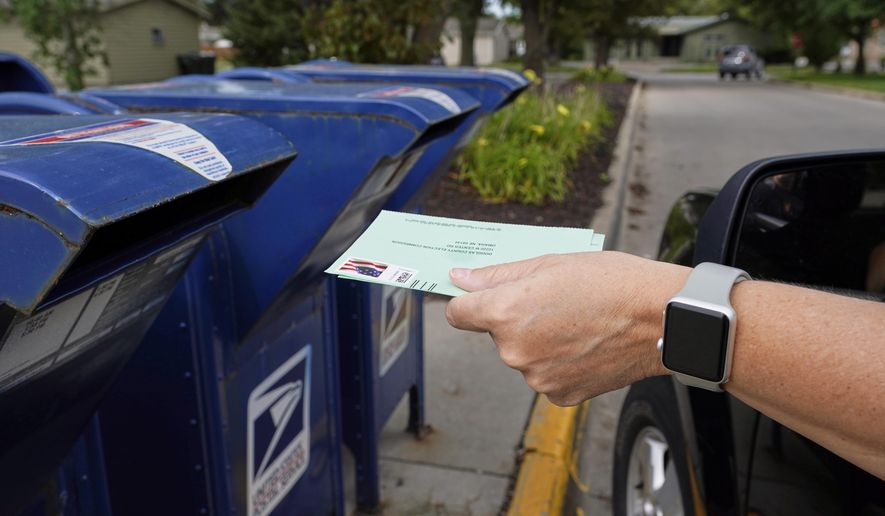A few swing states could be counting mail-in ballots days after Election Day in a rerun of the 2020 election, according to election law experts, who point to Pennsylvania, Wisconsin and Nevada as the ones to watch in November.
Nevada moved to all mail-in voting in 2022. All registered voters in the state are sent pre-posted mail-in ballots. Under state law, absentee ballots must be counted within seven days after Election Day, according to the National Conference of State Legislatures.
In 2020, Nevada’s results were certified roughly three weeks after Election Day, which fell on Nov. 3. Pennsylvania certified its results on the same day as Nevada.
J. Christian Adams, president of the Public Interest Legal Foundation, said litigation continues in both states over their mail-in balloting laws.
“Things are generally better than they were in 2020, but there are a couple of bad spots,” Mr. Adams said. “Nevada and Pennsylvania are the bad spots.
“Nevada has the worst mail-in voting system in the country,” he added.
SEE ALSO: Hundreds of volunteer GOP lawyers gear up in key swing states ahead of November
In Nevada, Mr. Adams’ organization has sued two counties over alleged issues with its voter rolls in an attempt to remove unverified commercial addresses, such as liquor stores and strip clubs, from receiving absentee ballots through its automatic vote-by-mail system.
The Public Interest Legal Foundation sued Clark County, home of Las Vegas, and Washoe County, which includes Reno, to ensure that commercial addresses on the voter rolls are accurate.
“You can’t go to an auto mail system and not have problems. It is the worst way to run an election,” Mr. Adams said.
Officials in Washoe County did not respond to a request for comment, and officials in Clark County said they could not comment on pending litigation.
Pennsylvania also faces litigation over mail-in ballot dates.
A state court recently ruled that ballots with handwritten dates missing from the envelope can be counted. Republicans plan to appeal that ruling to the state’s highest court, according to The Associated Press, which noted that elderly voters tend to have inaccurate or missing information on their ballots.
The state court ruling was a victory for liberal groups that challenged the date requirement.
Pennsylvania and the swing state of Wisconsin do not allow election officials to process mail-in ballots before Election Day, said David Becker, an election law expert who worked in the Clinton and Bush administrations and now is executive director of the Center for Election Innovation & Research.
He said that means those two Midwestern swing states — worth 19 and 10 Electoral College votes, respectively — likely will be the last to certify their results.
“A national election is not a national election,” he said, noting that localities conduct voting in various ways.
Mr. Becker said transparency is essential so any misinformation about election fraud can immediately be discounted, such as “spreading lies about mail-in voting and voting machines and illegals voting … particularly by [former President] Donald Trump.”
“Good-faith actors serving as observers for either party of either candidate play an essential role,” Mr. Becker said.
Some states have implemented more security measures for mail-in voting since the 2020 election.
Georgia now requires an ID for mail-in voting. North Carolina also requires an ID.
“I think in several places, we will be in a better place,” said Hans von Spakovsky, manager of the Election Law Reform Initiative at The Heritage Foundation. “Things have shaped up, so they are a little bit more secure in some of those states.
“I still don’t think voting by mail is a good idea for people. I think they should only do it if they can’t get to a polling place on Election Day or during the early voting period,” he said.
One major lawsuit hanging over mail-in ballots is Republican National Committee v. Wetzel, pending before the 5th U.S. Circuit Court of Appeals. It concerns ballots that roll in after the election.
The RNC sued a county clerk in Mississippi over the state’s allowing ballots to be counted up to five days after Election Day. The complaint says this violates federal election law, which designates one day for the election.
Oral arguments in the case are scheduled for Sept. 24.
• Alex Swoyer can be reached at aswoyer@washingtontimes.com.




Please read our comment policy before commenting.